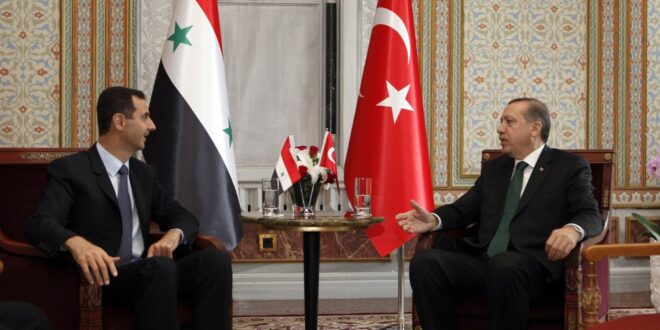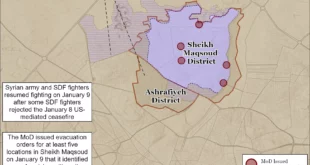Nearly two months ago, Turkish President Recep Tayyip Erdoğan spoke about the “possibility of developing relations” with “Mr. Assad”, marking a new phase that carried many official statements, political analyses, and “media speculations” about the place and time of a possible meeting between Erdoğan and the Syrian regime’s president, Bashar al-Assad. This was followed by an official denial of a flood of rumors and expectations that poured in this context, leaving the issue present in political discourse but without any political development to bring representatives of the two sides to the table.On August 25, Syrian regime president Bashar al-Assad delivered a speech before the People’s Assembly at the beginning of the fourth legislative session, dedicating a significant portion to discuss this pathway, its nature, and the reasons for the failure to achieve any progress from his perspective.
In his speech, al-Assad moved from the language of “the possibility of meeting, embracing, reproach, or kissing beards” that he spoke of last July, towards a more detailed approach about this pathway, indicating a serious and positive handling of the initiatives proposed regarding Turkey. He pointed out that the globally tense current situation and its reflections push for faster action to “fix what can be fixed.”
Al-Assad considered that the sincere desire to restore normal relations requires first removing the causes of the destruction of this relationship and retracting the policies that led to the current situation. He emphasized that these are requirements for the success of the process, not conditions, stressing not to concede any rights under any circumstances.
In al-Assad’s view, any negotiation process needs a reference to rely on in order to succeed. One of the reasons previous meetings failed to achieve results was the absence of a reference, which he considered to rest on several factors, including mutual agreements between the different parties, international law, the UN Charter, or several topics of interest to each party.
While discussing the Turkish conditions for normalization, al-Assad summarized them in the refugee file and the issue of combating terrorism. He did not address the matter of free elections and reaching a new constitution for Syria, which Ankara mentioned several times before adding and amending these conditions, by merely agreeing on combating terrorism and the Turkish withdrawal.
According to him, when these points are agreed upon, a joint statement should be issued through a meeting between officials from both sides at a level to be determined later. This statement would become a document forming the principles that would serve as a basis for actions that could be taken later regarding developing the relationship, withdrawal, combating terrorism, or other issues of mutual interest.
Al-Assad considered that the importance of this reference lies in organizing negotiations, preventing maneuvering or whims from either side, and acting as a tool upon which initiative owners can rely to succeed in their endeavors. He denied refusing to hold meetings with the Turkish side before withdrawal from Syria, under the pretext of acting “systematically and realistically,” stressing the importance of having clear goals and insisting on the idea of sovereignty.
The Turkish quadrant
The Turkish press read al-Assad’s vision of the normalization pathway as a stronger indicator of the possibility of a meeting between al-Assad and Erdoğan. Ankara then provided a more detailed picture of its expectations from normalization with the Syrian regime. Turkish channel CNN TÜRK reported on August 28, quoting Turkish Foreign Ministry sources, that restoring relations to what they were before 2011 is summarized in four main points.
According to what the Turkish channel stated, Ankara has four main expectations from normalization. The first is cleansing Syria of “terrorist elements” to preserve the safety of its lands.
The second expectation is that Syria achieves real national reconciliation with its people within the framework of UN Security Council Resolution 2254, based on the legitimate demands and expectations of its people, returning to constitutional negotiations, and reaching an agreement with the opposition.
The third expectation involves creating the necessary conditions for the safe and dignified return of refugees. The fourth expectation is the continuous flow of humanitarian aid to opposition-controlled areas without interruption.
According to the same sources, if understanding prevails and realistic approaches are implemented, it will pave the way for steps that can contribute to Syria’s welfare, the security of neighboring countries, and regional stability. They emphasized that this stance would not change for Turkey, and the dialogue that the regime holds with the opposition must be fruitful for Ankara. It is not conceivable for Turkey to make a drastic change or retreat from its relationship with the Syrian opposition.
To clarify the fourth expectation related to the flow of aid to the north, the sources explained that the issue of migration is intertwined with humanitarian aid, and when it’s impossible to provide UN aid, there will be a risk of migration, so it’s essential for aid to pass through Turkey and continue flowing.
Russian preoccupation might affect Turkish-Syrian rapprochement
Turkey’s statements did not stop there. Turkish media reported on August 29, during the weekly briefing of the Ministry of Defense, that Turkish presence in Syria prevents the division of Syrian lands and the establishment of a “terrorist corridor” there.
The Ministry of Defense spokesman added, “We want to see a democratic and prosperous Syria, not one suffering from instability and dominated by terrorist organizations.”
Strategic expert and non-resident researcher at the Stimson Center in Washington, Amer al-Sabaileh, told Enab Baladi that the essential desire for normalization is non-existent for both sides. It is more of a tactic to gain benefits from this step, explaining the Iraqi and Russian push and motivation for the meeting, meaning it’s not a Turkish-Syrian idea. It might be significant for Turkey’s related policies, but for the Syrian regime, there are no immediate benefits from this relationship.
The strategic expert suggested that the importance of the rapprochement idea might lessen in the current period, amidst Russia’s preoccupation with its war with Ukraine, which launched a ground incursion into Russian territories on August 6, capturing dozens of villages and towns.
He added that the Syrian regime is aware that Turkey has political interests in Syria and might exploit this to try ending the idea of the opposition. But it seems the regime is currently not concerned with this issue and does not want it to be the main card Turkey offers, which made it easier for Turkey to return to the first square in the escalation and stick to constants to revive the relations with the regime, according to the researcher.
Regarding the possibility that the current mutual statements’ atmosphere might lead to a meeting between Erdoğan and al-Assad, al-Sabaileh ruled out the possibility of reaching a significant agreement in the current period. He noted the possibility of holding this meeting as a tactic at a certain time, but regarding the balance of interests of both parties, the idea of the meeting and the return of relations without real gains dominates the scene.
On August 14, Turkish Defense Minister Yaşar Güler confirmed Turkey’s constitutional and electoral conditions regarding normalization with the Syrian regime, saying that the Syrian administration (referring to the regime) acts as if it does not want a period of peace, stressing the necessity of adopting a comprehensive constitution for Syria.
The Turkish minister confirmed that Ankara could not discuss withdrawal from Syria until after a new constitution is adopted, elections are held, and borders are secured. He added, addressing the regime, “Hold free elections, and whoever comes to power as a result of that, we say we are ready to work with them,” according to what was reported by Turkish media.
 Eurasia Press & News
Eurasia Press & News



